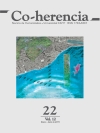André Malraux beyond his Anti-Memoir
Main Article Content
Keywords
Autobiography, memoirs, Malraux, modernity, subject, history, myth, anti-memoir
Abstract
Two hypotheses about the autobiographical genre –as well as about the self-portrait– seem to perfectly fit Malraux’s Antimémoires: first, that it is sterile to develop an interpretation based on the distinction between ‘truth’ and ‘fiction’ and, second, that any autobiography reflects a social and individual vision of the temporality, so that it thrives in contexts more susceptible to be historically considered as “new”. Malraux, as revealed by his Antimémoires, is an enigma that feeds off itself, the intertwined fragments of his life and the passages from his works. To try to unravel his mystery we will resort to three different perspectives on what we might consider “a possible Malrauxian theory about the three Malraux”. Besides that, we will turn to some writings in which self-reference is less evident and where Malraux proposed a peculiar vision of art and life, perhaps because he concealed exactly there the keys to the best approach to the sense of his career and thought.
Downloads
Download data is not yet available.
References
Assman, Jan (2011). Historia y mito en el mundo antiguo. Los orígenes de la cultura en Egipto, Israel y Grecia. Madrid: Gredos.
Blanchot, Maurice (1949). La part du feu. Paris: Gallimard.
Blanchot, Maurice (2007). “El museo, el arte y el tiempo”. En: La amistad. Madrid: Trotta.
Derrida, Jacques (1989). “Firma, acontecimiento y contexto”. En: Márge-nes de la filosofía. Madrid: Cátedra.
Elbaz, Robert (1988). The changing nature of the self: a critical study of the autobiographic discourse. London & Sydney: Croom Helm.
Foucault, Michel (1985). ¿Qué es la ilustración?En: Saber y verdad. Madrid: La Piqueta.
Grover, Frédéric (1978). Six entretiens avec André Malraux sur des écrivains de son temps (1959-1975). Paris: Gallimard.
Jameson, Fredric (2004). Una modernidad singular: ensayo sobre la ontología del presente. Barcelona: Gedisa.
Lyotard, Jean-François (1996). Signé Malraux. Paris: Bernard Grasset.
Malraux, André (1956). El museo imaginario. En: Las voces del silencio. Vi-sión del arte. Buenos Aires: Emecé.
Malraux, André (1971). Oraisions funèbres. Paris: Gallimard.
Malraux, André (1972). Antimémoires. Paris: Gallimard.
Malraux, André (1977). La vía real. Barcelona: Argos.
Malraux, André (2008). El demonio del absoluto. Barcelona: Galaxia Gu-tenberg.
Picon, Gaëtan (1958). Malraux par lui-même. Paris: Seuil.
Shapiro, Stephen (1968). “The dark continent of literature: autobiogra-phy”. En: Comparative Literature Studies, No. 5.
Stéphane, Roger (1984). André Malraux, entretiens et precisions. Paris: Ga-llimard.
Todd, Olivier (2001). André Malraux, une vie. Paris: Gallimard.
Blanchot, Maurice (1949). La part du feu. Paris: Gallimard.
Blanchot, Maurice (2007). “El museo, el arte y el tiempo”. En: La amistad. Madrid: Trotta.
Derrida, Jacques (1989). “Firma, acontecimiento y contexto”. En: Márge-nes de la filosofía. Madrid: Cátedra.
Elbaz, Robert (1988). The changing nature of the self: a critical study of the autobiographic discourse. London & Sydney: Croom Helm.
Foucault, Michel (1985). ¿Qué es la ilustración?En: Saber y verdad. Madrid: La Piqueta.
Grover, Frédéric (1978). Six entretiens avec André Malraux sur des écrivains de son temps (1959-1975). Paris: Gallimard.
Jameson, Fredric (2004). Una modernidad singular: ensayo sobre la ontología del presente. Barcelona: Gedisa.
Lyotard, Jean-François (1996). Signé Malraux. Paris: Bernard Grasset.
Malraux, André (1956). El museo imaginario. En: Las voces del silencio. Vi-sión del arte. Buenos Aires: Emecé.
Malraux, André (1971). Oraisions funèbres. Paris: Gallimard.
Malraux, André (1972). Antimémoires. Paris: Gallimard.
Malraux, André (1977). La vía real. Barcelona: Argos.
Malraux, André (2008). El demonio del absoluto. Barcelona: Galaxia Gu-tenberg.
Picon, Gaëtan (1958). Malraux par lui-même. Paris: Seuil.
Shapiro, Stephen (1968). “The dark continent of literature: autobiogra-phy”. En: Comparative Literature Studies, No. 5.
Stéphane, Roger (1984). André Malraux, entretiens et precisions. Paris: Ga-llimard.
Todd, Olivier (2001). André Malraux, une vie. Paris: Gallimard.




